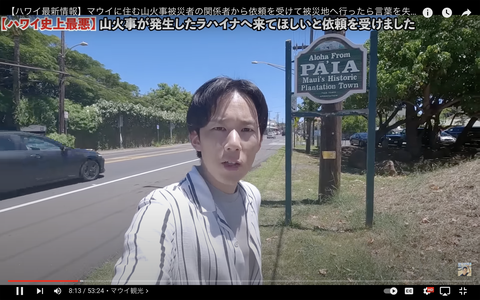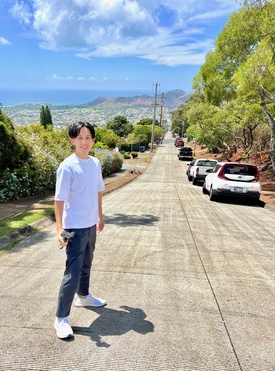
Moved to the US to become a pilot
I've been watching the videos of Chansuu, who continues to share information about Hawaii as a YouTuber, for a long time, but suddenly, his true value was shown in an episode in which he reported on the current situation on the disaster-stricken island of Maui. After introducing areas that can accommodate tourists other than the devastated Lahaina, Chansuu interviewed the head priest of a temple that was completely burned down. His sincere desire to help Maui, which derives much of its income from tourism, was conveyed in the video. Moreover, he was well-liked for not just wanting to "support Maui," but also for providing practical information to viewers, telling them, "If you're coming from Oahu, you can enjoy yourself even on a day trip."
At the beginning of each video, he introduces himself as "Chanceu, a Japanese man living in Hawaii," as if it were a catchphrase. Curious as to why he ended up living in Hawaii, whether he was in Japan before going to Hawaii, or in another American city, or even in a country other than the United States, I rewatched his past videos and discovered that he was originally from Mie Prefecture and had initially studied at a college in Orange County, a suburb of Los Angeles, with the goal of becoming a pilot. Furthermore, he was a former employee of the Japanese information publishing company where I was employed more than 30 years ago. Feeling a sense of kinship with him, I requested an interview, and Chansu readily agreed, making the online interview possible.
First, let me tell you about how I came to the United States.
"When I was in high school, I wanted to become a pilot and looked into schools in Japan, but ultimately I needed to learn English. I thought it would be better to go abroad from the start, so I did some research and found that studying aviation in America would be more economical than studying at a private university in Japan, and it would also be advantageous in terms of English, so I decided to study abroad in the US. However, because I wanted to go directly to America from Suzuka in Mie Prefecture, rather than to Nagoya or Tokyo, my high school guidance counselor didn't understand the situation and couldn't give me any information. That's understandable (laughs). In the end, although I was concerned about the large number of Japanese students there, I decided to study at Cypress College in Orange County."
Winning permanent residency and changing career path
Chansuu moved to the US right after graduating from high school, and at first, he was not used to English. He struggled with everything, including finding an apartment, and recalls that it was "like hell." Even so, he said, "There weren't many people I could rely on, so I just had to solve the problem myself. Even if things didn't go well and I went back to Japan, I wondered what I would do there. So I felt like I had no choice but to endure." Just as he was trying to overcome this difficult time, he received the good news that he had won the lottery for a permanent residence visa that he had applied for with his mother.
"It was May of the year after I went abroad. Before that, I had failed the physical test required to obtain a commercial pilot's license. It was a huge shock and I hit rock bottom. However, I was granted permanent residency, which meant that university tuition fees in the US would be cheaper, so I took a leave of absence and returned to Japan to get things back on track. After spending a year in Japan, when I returned to college I changed direction from being a pilot. I found accounting and economics classes interesting, so when I transferred to a four-year university, I majored in economics. The university I transferred to was the University of California, San Diego (UCSD)."
After graduating from UCSD, he had the option of finding work in the US as he had permanent residency. However, he decided to work for a Japanese company in order to take advantage of the benefits of Japan's new graduate system. "When I thought about how to get an entry-level job, I was attracted to the new graduate system (compared to the US, which places more emphasis on experienced people) because it seemed very advantageous."
Chansuu says that he was blessed with a good boss, good colleagues, and a good environment at the information publishing company where he got a job in Japan, and that it was a three-year period during which he was able to realize his own growth. However, his life as a salaryman in Japan came to an end after three years. The reason for this was the lockdown of US government agencies due to COVID-19. What does this mean?
"When you leave the US as a permanent resident, you obtain a re-entry permit, which is valid for two years. Just after I went through the process of renewing that, the lockdown occurred, and the process that would normally proceed smoothly after application came to a halt. After that, the US government told me that it was impossible to renew my re-entry permit, and I was forced to choose between giving up my permanent residency, or giving up my career in Japan and prioritizing my permanent residency."
America is a country of "self-responsibility"

As you can guess from the fact that he is now living in Hawaii, he chose permanent residency. He said that a friend outside the company told him, "It's a waste to throw away your career," but Chansuu asserts, "I've made different choices than others, so it's only natural that it's difficult for people to understand my situation. Rather than worrying about what others say, I chose to choose something that I wouldn't regret." From his expression, it's clear that he still has no regrets.
Chansu left Japan and went to Hawaii, where his mother had emigrated, and began working as a YouTuber about a year and a half ago. "I had always wanted to start a business, so I started on YouTube to let people know about me and gain their trust. A year and a half later, I had 30,000 subscribers, which was exactly what I had set out to do. It's exactly the method I learned at the company I used to work for: 'Set a goal, declare it, and work towards it.'"
So what's your next goal? "My goal is to become the most famous Japanese person in Hawaii in three years. At the same time, I'm steadily making preparations to start my own company, creating a business plan and meeting with investors."
Finally, when asked how he has changed in America, he answered, "I have come to feel more strongly that I am responsible for all the good and bad that comes as a result of thinking for myself and acting for myself." Indeed, the stance of "self-responsibility" has been very fitting for him, ever since he decided to study abroad on his own. Chansuu may stop at times on his way to becoming "the most famous Japanese person in Hawaii" and "an active entrepreneur," but he will surely continue to move forward.
*Chance's YouTube channel: @chance.u-world
© 2023 Keiko Fukuda





